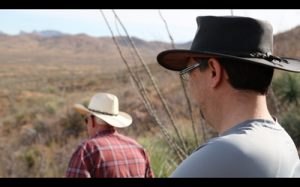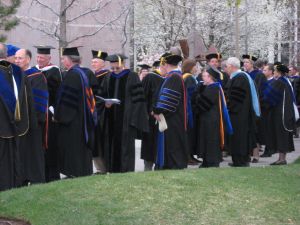Latino/a religious scholars speak often of hybridity to describe the mestizaje, the mixture of our cultures, our identities, our different social locations, and yet, the hybridity of our spirituality remains taboo. Hispanic liberationists argue for orthopraxis trumping orthodoxy; however, whichever clique one runs with enforces acceptance or rejection of other Latino/as based on doctrines professed. Ironically, while the Hispanic gatekeepers of Eurocentric religious orthodoxy remain very colonialist in advancing the one acceptable Truth, it seems to me that the vast majority of la gente hold a more hybrid spirituality. The Eurocentric rationalistic Enlightenment has taught us that you can only hold one religious truth, and all others must therefore be wrong. You can only be a Catholic or a Protestant, but not both. You must be a Christian or a follower of Indigenous or African traditions, but not both. You must choose.
When I did chose one over and against the others’ faith traditions, my spirituality was incomplete.
But when I did chose one over and against the others’ faith traditions, my spirituality was incomplete, as if seeing through a glass darkly. I grew up in a spiritually hybrid household (even though neither my parents nor I had any idea what hybridity meant). This was not only my norm, but also the norm of our family’s Hispanic friends while I was growing up. I would even argue that this is the norm for those of us who hail from the Caribbean. The ability of holding diverse and contradictory religious views in tension helps understand the diverse and contradictory metaphysical.
I was the first Latino pupil to ever attend Blessed Sacrament Catholic School in Jackson Heights, New York (I still have the ruler marks across my knuckles to prove it). I was baptized and confirmed in the Holy Mother Church, picking Saint Francis as my confirmation saint. In fact, I come from a long line of devoted Catholics. My grandfather was a Catholic priest (who lucky for me, met my grandmother while giving her communion). His first-born went to the Catholic seminary in Camagüey, as did all the de la Torre’s first-born. Uncle Enrique also left the priesthood because there were too many Marxist books in the library. I have no doubt that if we would have stayed in Cuba I too would have gone to the Catholic seminary in Camagüey.
While attending Blessed Sacrament, Vatican II was convened. I witnessed first-hand the radical changes that took place in our parish. During my confirmation I first discovered (in a very elementary way of course) the social teachings of the Church. It was the vow to serve in God’s mission that was uttered during Mass by a small boy that deeply impacted the man I would become. Today, to read any of my books or writings is to recognize how the social teachings of the church, Vatican II, and liberation theology are central to my theological thinking.
While I was attending Mass every Sunday, I would also offer sacrifices to Obatalá (my mother’s santo), Changó (my father’s), and of course Elegguá (my santo). My parents served the faith as a priest and priestess. I was a child of Elegguá, best known within the Santería faith tradition as the trickster. I wore his elekes — beaded necklaces — kept his image in a dish behind my front door, and was in line to become a santero, a priest of the faith. There was never any confusion in my mind, my parents’ minds or that of their house-congregation as to the difference between what was done at the Irish church down the street and what was done in our apartment.
From an early age, my parents explained that the rituals in which we participated could not be revealed to the priests and nuns because they were “confused” about how God works, and if they found out that we had el conocimiento (the knowledge), I would be expelled. When I asked what we were, they would reply without hesitating, as if by rote, “We are apostolic Roman Catholics, but we believe in our own way.” Like many Hispanics, I grew up within a hybrid spirituality where I could be a good Catholic boy who prayed the rosary by day and a faithful Santería devotee making offering to Elegguá by night. Although theologian purists will be quick to point out the contradictions of my religious practices, those of us who participate in the faith of the people recognize and hold a more fluid understanding of spirituality. Today, to read any of my books or writings is to recognize how the trickster image is central to my theological thinking.
In my early twenties, motivated by a misguided desire to assimilate to the dominant culture, I walked down a Southern Baptist church aisle and gave my heart to Jesus. Eventually I would go to Southern Baptist Theological Seminary and pastor a rural church in Kentucky. As a Southern Baptist ordained minister, I did more than simply put aside my previous religiosity. I learned from spiritual mentors that Catholicism was idol worship due to all the statues of saints in churches, and that the Pope was akin to the antichrist. As to my Santería, this was clearly of the devil. All of the santos venerated were in fact demons. I accepted these interpretations without question and to my detriment turned my back on my spiritual roots with the fervor of a new convert. Regardless of my assimilation tendencies at the time, I was nevertheless ministered to by concepts like “the priesthood of believers,” “the autonomy of the local church,” and “no creed but the Bible,” (concepts I might add are not really followed by the Southern Baptist Convention today). I was influenced by an evangelical zeal to share the good news. Today, to read any of my books or writings is to recognize how sharing the good news of salvation (understood as liberation from institutionalized and personal sins) is core to my theological thinking.
As I reclaimed the hybrid spirituality of my people, I moved away from a rigid understanding of doctrine.
To be a Southern Baptist, Roman Catholic Child of Elegguá is not some New Age tendency of sampling and appropriating the religious traditions of others at some spiritual cafeteria buffet-line; rather, it is embracing the traditions that formed and shaped my spirituality. Decades of commitment with the marginalized of these different traditions has informed my understanding of that which is beyond my understanding. As I reclaimed the hybrid spirituality of my people, I moved away from a rigid understanding of doctrine and instead boldly began to wrestle with and against faith concepts that bring oppression to the most vulnerable.
And yet, I find some of my fellow Hispanic religious scholars’ emphasis on orthodoxy refusing to join me in the orthopraxis struggle for justice. Recently, I received a slap on the wrist from a fellow Catholic scholar for speaking to the news media about the Pope, suggesting that I should have referred the reporter to a Catholic scholar. Just to be clear – I am a Catholic – damn it, and probably more Catholic than so many cultural Catholics who are Catholic in name only. It’s fine if some Latina/o Catholic groups refuse to recognize my Catholicism because I don’t necessarily recognize their authority in naming what I am and what I believe. Likewise, I am an Evangelical sharing the good news that God has called all of us to life and life abundantly (Jn. 10:10); and due to that call, have dedicated my life to struggle for a justice that can provide an abundant life.
And just as I can speak with authority as a Catholic and as an Evangelical, so too can I speak with authority as a child of Elegguá – porque lo que me dio Elegguá no hay quién me lo quite.
First Published in Cuba Counterpoints



